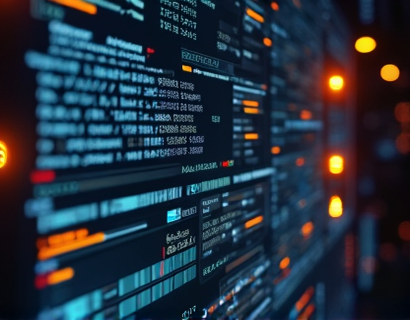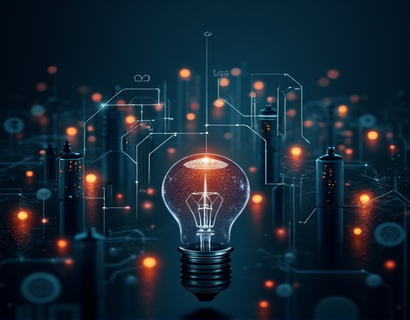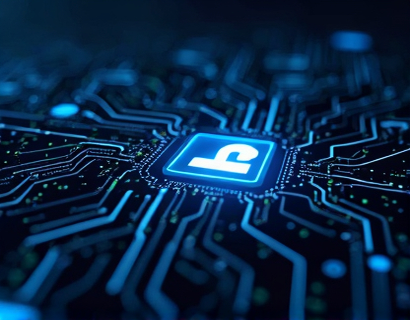Unlocking Digital Transformation: Harnessing AI and Crypto for Enhanced User Experiences
The digital landscape is rapidly evolving, driven by technological advancements that redefine how we interact with technology and each other. At the forefront of this transformation are two revolutionary forces: Artificial Intelligence (AI) and Cryptocurrency. These technologies, when merged, offer unprecedented opportunities to unlock transformative digital experiences. This article delves into the strategic insights for tech innovators and early adopters aiming to enhance user engagement and drive growth by leveraging the synergy between AI and cryptocurrency.
Understanding the Synergy Between AI and Cryptocurrency
AI and cryptocurrency may seem like disparate entities, but their convergence holds immense potential. AI, with its ability to process vast amounts of data and learn from patterns, can optimize various aspects of cryptocurrency systems. Conversely, cryptocurrency provides a decentralized and secure environment for AI applications to thrive without the constraints of traditional financial systems. This synergy can lead to more efficient, secure, and user-centric digital experiences.
Enhancing User Engagement Through AI-Powered Crypto Solutions
One of the primary ways AI and cryptocurrency can enhance user engagement is through personalized experiences. AI algorithms can analyze user behavior and preferences to tailor cryptocurrency services, such as wallet recommendations, investment advice, and transaction suggestions. This personalization not only improves user satisfaction but also increases the likelihood of user retention and active participation in the crypto ecosystem.
For instance, AI-driven chatbots can offer real-time support and guidance to users navigating complex crypto markets. These chatbots can provide explanations, answer queries, and even assist in making informed investment decisions, thereby reducing user friction and enhancing the overall experience.
Security and Trust: A Critical Component
Security is paramount in the crypto space, and AI can play a crucial role in bolstering it. AI-powered security systems can detect and mitigate threats in real-time, identifying anomalies and potential vulnerabilities before they are exploited. This proactive approach to security can significantly enhance user trust in crypto platforms and services.
Moreover, AI can facilitate the creation of more robust and transparent blockchain networks. By optimizing consensus mechanisms and improving scalability, AI ensures that transactions are processed efficiently and securely. This not only enhances the reliability of crypto platforms but also makes them more appealing to a broader audience, including those who are new to the space.
Decentralized Applications (DApps) and AI Integration
Decentralized Applications (DApps) are a prime example of how AI and cryptocurrency can converge to create innovative user experiences. DApps leverage blockchain technology to provide decentralized services, and when integrated with AI, they can offer intelligent and adaptive functionalities. For example, AI can enhance the user interface of DApps, making them more intuitive and user-friendly. It can also optimize the performance of smart contracts, ensuring they execute efficiently and accurately.
In the realm of finance, AI-integrated DApps can provide advanced trading platforms that use machine learning to predict market trends and suggest optimal trading strategies. These platforms can democratize access to sophisticated financial tools, making them available to a wider range of users.
Data Privacy and User Control
Data privacy is a growing concern in the digital age, and the combination of AI and cryptocurrency can address this issue effectively. Blockchain's inherent transparency and immutability, coupled with AI's data processing capabilities, can create systems where users have full control over their data. AI can help implement advanced encryption methods and zero-knowledge proofs, ensuring that user data remains private while still being useful for personalized services.
Furthermore, AI can assist in managing and optimizing data usage, ensuring that only relevant and consented data is used for personalization. This approach not only enhances user privacy but also builds trust, a critical factor in user adoption and loyalty.
Economic Incentives and Tokenization
Cryptocurrency introduces a new paradigm of economic incentives through tokenization. AI can optimize token distribution and utility, ensuring that tokens are used effectively to motivate desired behaviors. For example, AI can analyze user interactions and reward them with tokens for engaging activities, such as referring new users or participating in community discussions. These tokens can then be used within the ecosystem to access premium services or goods, creating a self-sustaining and user-driven economy.
Tokenization also extends to assets and real-world objects. AI can facilitate the tokenization process by evaluating the value and uniqueness of assets, making it easier to represent and trade them on blockchain platforms. This can open up new opportunities for creators and owners to monetize their assets in innovative ways.
Scalability and Interoperability
As the crypto and AI landscapes continue to grow, scalability and interoperability become crucial. AI can help optimize blockchain networks to handle increasing transaction volumes without compromising speed or security. Techniques such as sharding and layer 2 solutions can be enhanced with AI to dynamically adjust network parameters based on real-time data.
Interoperability between different blockchain platforms is another area where AI can make a significant impact. AI-driven protocols can ensure seamless communication and data exchange between disparate systems, creating a more cohesive and interconnected crypto ecosystem. This interoperability not only enhances user experience but also fosters innovation by allowing developers to build on existing platforms and technologies.
Case Studies and Real-World Applications
Several projects and platforms are already leveraging the combination of AI and cryptocurrency to create transformative user experiences. One notable example is a decentralized finance (DeFi) platform that uses AI to optimize lending and borrowing processes. The platform analyzes user creditworthiness and market conditions to offer personalized loan terms and interest rates, making finance more accessible and fair.
Another example is an AI-powered crypto portfolio manager that uses machine learning to diversify and optimize investment portfolios. This tool provides users with actionable insights and automated trading strategies, reducing the need for extensive financial knowledge and expertise.
Challenges and Considerations
While the potential of AI and cryptocurrency is vast, there are challenges that must be addressed. Regulatory uncertainty remains a significant hurdle, as governments worldwide grapple with how to regulate these emerging technologies. Tech innovators must stay informed and compliant with evolving regulations to ensure their solutions are legally sound.
Technical challenges, such as ensuring the security and reliability of AI systems in a decentralized environment, also require careful consideration. Continuous research and development are necessary to overcome these challenges and build robust, user-trusted solutions.
Future Outlook
The future of digital transformation through AI and cryptocurrency is bright, with numerous opportunities on the horizon. As technology advances, we can expect to see more sophisticated AI-driven crypto applications that further enhance user experiences. The integration of AI with other emerging technologies, such as the Internet of Things (IoT) and augmented reality (AR), will open up new frontiers for innovation.
For tech innovators and early adopters, embracing this synergy is key to staying ahead in the competitive digital landscape. By understanding and leveraging the strengths of both AI and cryptocurrency, they can create groundbreaking solutions that drive growth, engagement, and value for users.
In conclusion, the convergence of AI and cryptocurrency represents a powerful force for digital transformation. By harnessing this synergy, we can unlock new possibilities for user engagement, security, and innovation, shaping a more connected and empowered digital world.










































